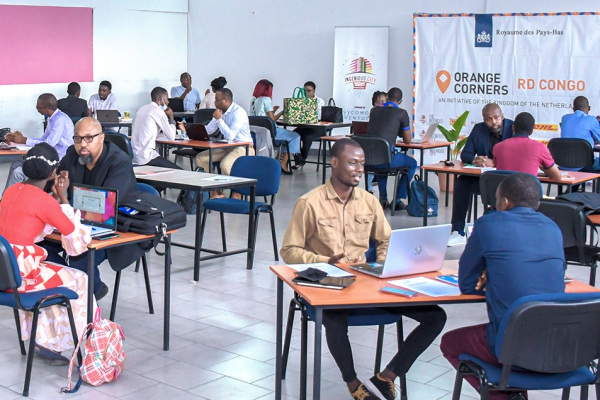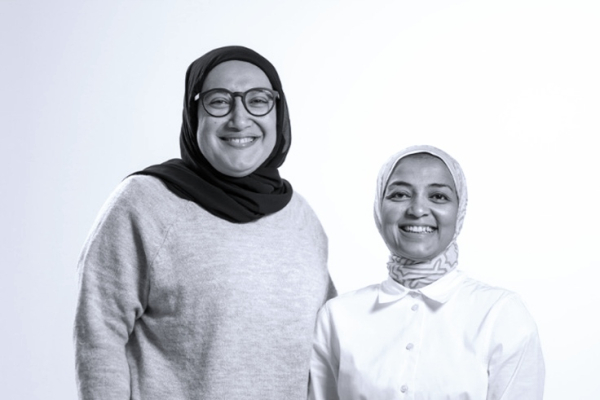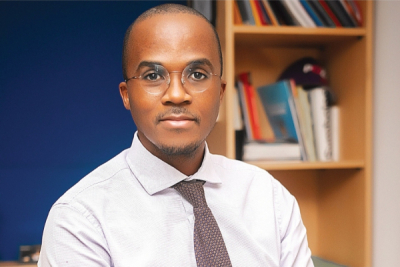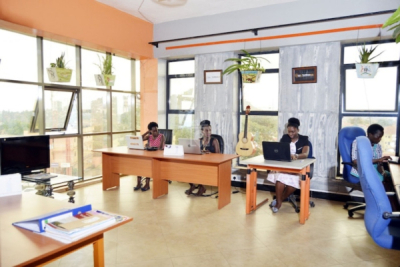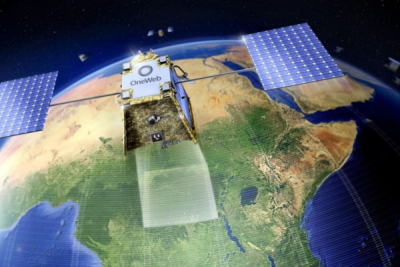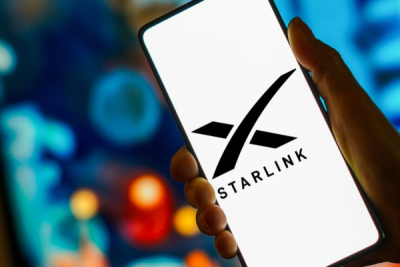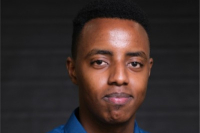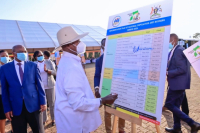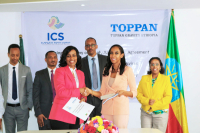DR Congo: Ingenious City Cultivates Entrepreneurial Skills, Promotes Entrepreneurship and Networking
Ingenious City is a DR Congo-based hub that connects entrepreneurs and enables them to collaborate for the development of impactful solutions. It has already incubated over a hundred projects and continues to promote entrepreneurship.
Ingenious City, a Congolese incubator founded in 2018 by Alexis Indenge and François Ngenyi, promotes entrepreneurship and fosters connections among ecosystem players in DR Congo. Its main goal is to cultivate collaboration among entrepreneurs to create impactful solutions.
In practical terms, Ingenious City offers tailored training modules focused on entrepreneurship, specifically designed for the Congolese ecosystem. The incubator offers guidance and advice to enhance the performance of innovative ideas. To facilitate networking and cooperation, Ingenious City provides a well-equipped 1,200-square-meter physical workspace for entrepreneurs. Through its business incubation service, it supports the launch of startups by offering a professional workspace and access to essential resources, including financing.
Ingenious City identifies projects that provide tangible solutions to societal challenges, offering them logistical support and financial backing to kickstart their operations. The incubator extends its support to projects spanning technology, agri-food, industry, and services.
Leveraging a network of over 150 experts and mentors, Ingenious City has successfully incubated over 100 projects since its inception. The incubator enjoys support from more than 25 partners and sponsors, including RAWBANK.
Melchior Koba
Egyptian health technology startup Chefaa announced, Tuesday, December 19, the successful completion of a $5.25 million funding round. The raised funds are earmarked for various purposes, including the advancement of its technology, broadening its range of offerings, and supporting its growth in Saudi Arabia—a market the startup recently entered.
He studied business administration, accounting, and finance. However, he specializes in communications and digital technology. He developed, with his team, an app to facilitate fleet management.
Loic Kapitho (photo), a seasoned Gabonese entrepreneur with expertise in communications and digital sectors, co-founded POZI App, a tracking application designed to make life easier for vehicle owners and fleet managers.
The entrepreneur holds a bachelor's degree in business administration from ICN Business School, earned in 2008, and a master's degree in accounting and finance from Gabon's National Institute of Management Sciences, also obtained in the same year. In 2020, he joined forces with Thomas Leluc to establish POZI App, aiming to empower vehicle owners and fleet managers by providing tools for monitoring, analyzing, and optimizing their business operations.
Specializing in vehicle tracking and fleet management, POZI App analyzes users' journey performance, identifying risks, and highlighting opportunities across all their vehicles.
"Our application has three specific features. Firstly, we offer the most accurate and local mapping on the market. Secondly, we offer a modern, innovative user experience with, for example, the possibility of real-time, contextualized incident notifications on one's smartphone and automatically generated analytical reports. Our interface is very 'user friendly', accessible, and takes into account the increasing mobility of users," said the entrepreneur in 2021.
POZI App's ambition is to become the market leader in Gabon by 2024. The startup has already reached the symbolic milestone of 1,000 active vehicles, positioning itself as a benchmark application for businesses and semi-professionals.
Loic Kapitho is also the founder and CEO of TOUCH Innovative, a digital communications agency and digital advertising sales house set up in 2016. He is also chairman of TECH 241, Gabon's technology business union, which brings together major companies and professionals in the digital and technology sectors.
His professional career began in 2008 at Trade & Services, a Gabonese SME specializing in graphic design and creation, where he was director. Between 2011 and 2015, he worked at JTC Consulting in Gabon as Strategy and Communications Manager.
Melchior Koba
Through its programs and activities, TechBuzz Hub empowers young African entrepreneurs to develop innovative solutions. With international awards to its credit, it continues its ascent, impacting Africa.
TechBuzz Hub is a Ugandan startup incubator and coworking space helping entrepreneurs turn their ideas into sustainable businesses. Established in 2016 by Keneth Twesigye, who serves as its CEO, the hub is dedicated to fostering the growth of early-stage startups led by individuals aged 18 to 35.
Its offerings to achieve that goal encompass inclusive coworking spaces, startup incubation programs, and informative seminars. Beyond physical spaces, the hub extends critical business development services, including mentoring, consulting, and networking opportunities. These initiatives have proven instrumental in empowering numerous entrepreneurs, enabling them to fulfill their dreams and turn their ideas into reality.
TechBuzz Hub introduced Offisa, a virtual space network serving as a remote office that allows entrepreneurs to efficiently manage their business operations. It also organizes meetings that bring together entrepreneurs, startups, and business owners, fostering collaboration, and sharing of experiences, and providing a platform to track company progress while benefiting from expert support.
The incubator also hosts the Fortnyt Series, a series of fortnightly workshops designed to offer mentor-to-entrepreneur and peer-to-peer technical assistance. Additionally, the hub has launched the Young Professionals Program, geared towards supporting recent graduates and those entering the job market. This program focuses on equipping young individuals with practical skills and knowledge highly sought after in the job market, enhancing their job readiness.
TechBuzz Hub's commitment to capacity building is evident in its diverse training programs covering business modeling, roadmap, and strategy development, project management, business planning, graphic design, website design, computer applications, and financial projections. These training courses are designed to be open and customized, providing a holistic approach to building business capacity.
In 2023, the incubator won the prize for best coworking space at the Global Startup Awards Africa. A member of the AfriLabs network, it is supported by Mastercard Foundation and Startup Uganda, among others.
Melchior Koba
According to DataReportal stats, in early 2023, Libya’s internet penetration rate was 45.9% for 3.14 million users. To fill the gap, internet service providers are teaming up with major international groups.
On Wednesday, December 13, Eutelsat OneWeb, a British satellite Internet provider, announced a memorandum of understanding with Libyan Internet service provider Rafawed Libya for Telecommunications & Technology (RLTT) to use its constellation of low-Earth orbit (LEO) satellites to improve the quality of high-speed, low-latency connectivity throughout Libya. The contract will take effect from 2024.
"We have been working with Eutelsat Group for several years now and are excited to bring its high-speed, low-latency connectivity to our customers across the oil and gas, cellular backhaul, and humanitarian sectors. By combining both LEO and GEO-powered connectivity, we can meet the different needs of our customers without having to use multiple providers. Through this exclusive deal, we look forward to bringing unmatched connectivity across Libya," said Taha Ellafi, Chairman of RLTT.
The partnership, which is part of the British satellite Internet provider's planned African expansion, reinforces the longstanding partnership between the Libyan operator and Eutelsat, dating back to 2013. With Eutelsat's recent merger with OneWeb, the company is now equipped to provide not only geostationary solutions but also low-Earth orbit alternatives. These expanded capabilities are being passed on to RLTT as part of the enhanced contract.
"We continue to see huge demand for high-speed connectivity as we roll out our LEO services globally, with the wide variety of potential use cases that the increased resilience offers proving highly attractive to customers. By building on existing customer relationships, we can grow the business in international markets and continue to bridge the digital divide globally," explained Cyril Dujardin, Co-General Manager of Eutelsat OneWeb.
Adoni Conrad Quenum
US-based satellite broadband provider Starlink announced its rollout in Eswatini on Monday, December 18th, via a post on social media platform X. Accessing the services in Eswatini requires a one-time hardware purchase of 12,000 Rand (~$648) and a monthly subscription fee of 950 Rand, plus a 120 Rand regulatory fee. Shipping and handling costs 450 Rand. This rollout marks the eighth African country to welcome Starlink's high-speed internet services this year.
Recognizing the transformative power of digital solutions, Egypt prioritizes international cooperation in its "Digital Egypt 2030" strategy. Recent ICT and telecoms agreements address critical infrastructure gaps and pave the way for a digitally fueled future, unlocking greater socio-economic prosperity.
The United Arab Emirates and Egypt recently signed a memorandum of understanding to establish a comprehensive framework for investment cooperation in the field of digital infrastructure, with a particular focus on data center projects in the Arab Republic of Egypt.
The agreement also provides for the improvement of relations between governmental and private institutions in the United Arab Emirates and Egypt, the development of certifications, research and development, and innovation in data center projects. According to the press release announcing the signature, a joint action plan and mechanisms for monitoring the implementation of the memorandum will also be developed through cooperation between the two parties.
"This memorandum supports our joint efforts to drive innovation and growth, contribute to the development of the digital economy in the Arab Republic of Egypt, and develop its digital infrastructure in preparation for the future," said Mohamed Hassan Alsuwaidi (photo, left), UAE Minister of Investment.
The signing of the MoU aligns with the Egyptian government's efforts to implement its "Digital Egypt 2030" digital transformation strategy, which aims to propel the country's ICT sector, modernize its telecoms infrastructure, and establish a robust network of data centers across the nation.
Ultimately, the agreement will enable the development of data centers with a total capacity of up to 1,000 megawatts, meeting the growing need for data centers in Egypt. Currently, the country operates 15 data centers while data from Statista reveals that the Egyptian data center market is poised to grow by 7.23% (2023-2028) to reach a market volume of $369.90 million by 2028.
Samira Njoya
Across Africa, a fintech revolution is underway, fuelled by over $2.7 billion in investment since 2021. In Kenya, where the scene is particularly fertile, 24-year-old Collins Kathuli exemplifies a new generation of entrepreneurs democratizing access to financial services.
Collins Kathuli (photo), a Kenyan computer scientist and technology entrepreneur with a focus on the finance sector, is the co-founder and CEO of Kyanda, a startup committed to providing affordable financial services and addressing the issue of unbanked and underbanked populations in Africa.
Established in 2019, Kyanda's vision is to offer secure and convenient access to financial services at an affordable rate, efficiently and transparently, to reach everyone, anytime. The platform facilitates money transfers, payments, and bill settlements from the comfort of users' homes, catering to both individuals looking to streamline their finances and business owners seeking to optimize financial operations. Having successfully served over 10,000 users in Kenya, Kyanda recently expanded its reach to South Africa. The platform notably enables South Africans to form or join groups to collectively save money towards shared objectives.
Collins Kathuli earned his Bachelor's degree in Software Engineering from KCA University in March 2023. Since 2021, he has been actively contributing as a mentor at Techstars Startup Weekend Nairobi, a 54-hour event designed to provide valuable experiential training for both technical and non-technical entrepreneurs.
The winner of the Anzisha Prize 2022 has received several awards and distinctions during his entrepreneurial career. In 2020, at the FOYA Awards, he received the fintech founder of the year award in East Africa, and in 2021 the first prize at the Global Student Entrepreneurship Awards. In 2022, his company was voted best fintech in Kenya, and he won the Fintech Innovator of the Year award at the Africatech Festival.
Melchior Koba
Prior to the digital revolution, centralizing population and housing data collected on paper was a cumbersome and time-consuming process. Data extraction could take months, hindering its use by government agencies like the Ministry of Health and the Ministry of Education. Today, information and communication technologies have transformed this landscape.
On Tuesday, December 12, President Yoweri Museveni officially unveiled the country's 11th National Population and Housing Census (NPHC), set to unfold in May 2024. This time, the census will be completely digital. No more bulky paper registers. Everything will be done using connected digital tablets.
According to the Executive Director of the Uganda Bureau of Statistics (UBOS), Chris Ndatira Mukiza, digitization will not only minimize errors associated with paper-based data entry in previous years, but will also shorten the publication date of the final data. The first results are expected in the second quarter of the year.
"So this will be the record time because we have been taking 2-3 years to reach the final product. But now because of electronic devices, we have cut so many steps," explained Mukiza.
To carry out the NPHC, the government will finance over 91% of the activities, i.e. 320.9 billion shillings (around $84.6 million). In addition to financial resources, the government will also deploy enumerators to households. They will be provided with digital tablets for the census.
In February 2023, 20 computers and digital accessories were handed over to the Bureau of Statistics to ensure that the process runs smoothly.
This census is the sixth to be carried out post-independence, the first digital, and the third conducted by UBOS. It is part of the 2030 Development Agenda, the 2063 Agenda for Africa, Uganda's Vision 2040, and the 4th Development Plan (NDPIV) that the government is about to launch.
Samira Njoya
As part of its digital transformation process, the Ethiopian government is investing in digital identification. The new project in that line is an e-passport initiative.
On Wednesday, December 13, the Ethiopian Immigration and Citizenship Services (ICS) and Toppan Gravity Ethiopia –a joint venture between Ethiopian Investment Holdings, Toppan Group, Berhanena Selam Printing Enterprise, and Educational Materials Production and Distribution Enterprise– officially signed a supply and services agreement to begin work on the new Ethiopian e-passport. The aim is to provide the country with a new, more secure travel document.
"This partnership marks a significant stride in modernizing Ethiopia's passport system, offering enhanced security features and improved efficiency," reads a tweet by the Immigration and Citizenship Services.
In recent years, Ethiopia has implemented several digital projects aimed at improving population identification. For instance, it set up the Fayda, a World Bank-supported program aimed at registering 90 million people by 2025. A similar program has also been set up to provide digital identification for 90,000 refugees and returnees on Ethiopian soil.
In a country that is immense in size and torn by internal conflicts between various ethnic groups, the introduction of the e-passport should significantly reduce the risk of identity forgery and fraud, thanks to additional levels of identity verification.
Adoni Conrad Quenum
More...
Driven by a passion to empower African businesses, he returned to his native Benin after his agro-economics and veterinary studies in China. He has since launched an e-commerce platform that connects African businesses to global markets.
Yarou Bao Sero Razack (photo) is a veterinary surgeon and agro-economist hailing from Benin. He is also the co-founder and CEO of Ahiyoyo, a startup dedicated to streamlining the procurement, distribution, and payment processes for companies, resulting in significant time and cost savings.
Ahiyoyo was born in 2019 to connect businesses with international suppliers and local consumers. Its primary aim is to assist enterprises in reducing procurement costs, expanding their operations across diverse African countries, and facilitating seamless transactions with global suppliers, ultimately enhancing overall profitability.
In a recent interview with We Are Tech Africa, Yarou Bao Sero Razack outlined Ahiyoyo's ambitious plans for the future. The company has extended its presence beyond Benin, deploying team members to Côte d'Ivoire, Senegal, and Burkina Faso. Ahiyoyo's future roadmap includes geographical expansion through the establishment of warehouses and agencies, diversification of services, forging strategic partnerships, and a commitment to continuous innovation. The CEO explains that the startup eyes 25,000 transitions by December 2025 as well as $3 million in turnover and 1,000 registered businesses by that timeline.
Recently in Togo, the entrepreneur took part in Ocean's News' L'Afrik De Demain (ADD) program and was awarded the prize for second best African entrepreneur. Expressing his satisfaction with the recognition, he told We Are Tech Africa: “The award I received during Ocean's News' L'Afrik De Demain program represents a significant recognition of my efforts as an African entrepreneur. Being ranked second-best African entrepreneur at this annual conference is a source of immense pride and a validation of the work accomplished with Ahiyoyo.”
On the educational front, Yarou Bao Sero Razack holds a veterinary medicine degree from Hunan Agricultural University (2018) and a master's degree in agricultural economics from Southwest University (2021).
A board member of edtech Yasiri and a business mentor at VC4A (Venture Capital for Africa), he worked in China at HIMANX, a Chinese tobacco company, where he was a brand development specialist from 2019 to 2020.
In addition to the ADD award, the entrepreneur received several other distinctions in 2023. A member of the ForbesBLK community, he was one of the top 25 founders selected for the Westerwelle Foundation's Young Founders Programme. He is also a FAST Accelerator Fellow.
Melchior Koba
She joined the CcHub technology innovation center in 2021 as co-founder and managing partner of Creative Economy Practice. Her appointment as head of the center is the result of her leadership in these previous positions.
Ojoma Ochai (photo), a Nigerian creative economy expert with a specialization diploma in Network Engineering from the NIIT Abuja Centre in 2005, has assumed the role of Managing Director at Co-creation Hub (CcHub). Her appointment was officially announced on Thursday, December 14, 2023.
Taking over as Managing director from co-founder Bosun Tidjani, who currently serves as Nigeria's Minister of Communication, Innovation, and Digital Economy, Ojoma Ochai is now responsible for overseeing the strategy and team of Co-creation Hub Africa. This includes the management of CcHub Design Lab Rwanda, CcHub Namibia, CcHub Syndicate, Creative Economy Practice at CcHub, and iHub Kenya.
"I am proud of the work that CcHUB has achieved since 2010 and it is a great honor of my life to take a deeper step into CcHUB as its Managing Director. I stand on the shoulders of giants Dr. Bosun Tijani, Femi Longe, and Adetunji Eleso and previous leaders and managers at CcHUB who have built a phenomenal African organization that I am now truly honored to lead," she posted on her LinkedIn page.
Before this appointment, the Nigerian was the Managing Partner of Creative Economy Practice, a CcHub unit dedicated to stimulating innovation and the application of technology for the development of the creative economy in Africa.
Ojoma Ochai sits on several boards, including ₿trust, backed by tech and creative industry leaders Jack Dorsey and Jay Z to support the development of Bitcoin Open Source in the Global South. She has also been a member of the UNESCO Expert Group since 2012. Between 2010 and 2021, she worked for the British Council. There, she successively held the positions of Director of Arts in Nigeria (2010-2017) and East Africa (2017-2018), Director of Programmes in the Sub-Saharan Africa region (2018-2020) and Regional Director of Programmes for the Arts and Creative Economy in Sub-Saharan Africa (2020-2021).
For her work and dedication, Ojoma Ochai was named, by Y Naija Magazine, as one of the 10 most influential people under 40 in arts and culture in Nigeria in 2014, as well as one of the 100 most influential Nigerians and 100 most inspiring women in Nigeria in 2015.
Melchior Koba
The incubator provides six months of intensive support to companies in the ideation stage. Its incubation program has empowered over 200 projects in Tunisia across three editions.
Founded in 2015, Afkar Incubator is a Tunis (Tunisia) -based incubator currently led by Walid Hached and Houssem Aouidi.
The incubator aims to empower individuals with innovative ideas for social change. It supports social innovators by nurturing them into change catalysts, content creators, and influential figures in civil society- individuals poised to become tomorrow's leaders of change. It particularly focuses on projects in the ideation phase that demonstrate creative solutions to existing problems.
Its flagship initiative is a free six-month incubation program that provides a collaborative and diverse environment that encourages collaborative intelligence, friendship, and a wealth of experiences. Entrepreneurs in the program concentrate on formulating their value proposition, conducting experiments, testing and validating hypotheses, developing business plans, creating proof of concept and minimum viable product (MVP), building their brand, and raising awareness.
Addressing the need for greater inclusion of women in the entrepreneurial sector, Afkar Incubator has introduced a program called Afkar Mubadirat. This initiative creates networking opportunities for women across different regions of the country, with recent launches in Jendouba and Sidi Bouzid.
In terms of impact, the incubator has supported 264 projects and 450 grantees, with 56% being men and 44% women. It has financed 54 projects and incubated 42 entrepreneurs in regional innovation hubs spread across seven regions of Tunisia. Thanks to the program, 131 startups have been launched, and 63 have received accreditation.
Among the notable technology companies Afkar Incubator has supported are JTKids, a series of technological construction games for children promoting creative experiences and playful learning; ODIOFIL, a platform offering a variety of audio content, from radio podcasts to audiobooks; IDARA, an online guide facilitating access to administrative procedures in Tunisia; and JAM, an artist matchmaking and creative space reservation application.
Afkar Incubator achieved these results with the help of its partners, including the National Deposit and Consignment Fund (CDC), French technical cooperation agency Expertise France, French development agency AFD, the European Union, Germanic Development Agency GIZ, Agence française de développement, the European Union, GIZ, capacity-building project ProGreS Migration and global incubator Faster Capital.
Melchior Koba
According to the World Bank, the digital economy could generate more than $5.5 billion for Côte d'Ivoire by 2025, and more than $20 billion by 2050. However, seizing this golden opportunity requires immediate investment in critical infrastructure and initiatives.
Ibrahim Kalil Konaté (photo, center), Ivorian Minister for Digital Transition and Digitization, launched the construction of the next national data center in Abidjan on Thursday, December 14, in the presence of Jessica Davis Ba (photo, left), US Ambassador to Côte d'Ivoire. Certified Tier 3, the 2,200-terabit infrastructure will be built on a 20,000-square-meter site at the headquarters of the Radio Frequency Management Agency (AIGF) in Marcory-Anoumabo. The construction budget is $60 million.
"The National Data Center symbolizes our quest for digital sovereignty. It is designed to stimulate the dematerialization of administrative procedures, thus serving to modernize our public administration. As a catalyst for innovation, this Data Center will not only host the data of national administrative entities but also offer disaster recovery and business continuity solutions, thereby strengthening the resilience and security of our information systems," said the Minister.
The project aligns with the national digital development strategy, which was formally adopted in 2021. This comprehensive strategy, announced by Amadou Coulibaly, the then Minister for the Digital Economy, in June 2022, encompasses not only the construction of vital facilities but also the ambitious deployment of 7,000 kilometers of fiber optics by 2025.
Data centers are key to the ongoing digital transformation. African countries therefore need to invest in these infrastructures especially since the continent hosts only 2% of the global data centers, according to the International Telecommunication Union.
Adoni Conrad Quenum


